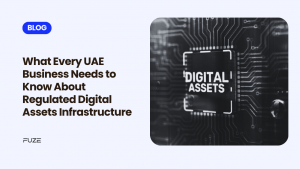Imagine walking into your favorite Dubai café and paying for your coffee with Bitcoin or USDT. Not in theory, right now, today. Sounds futuristic? It’s not. Businesses across the UAE are beginning to accept digital assets as payment, and it’s happening faster than most people realize.
But here’s the catch: accepting crypto legally in the UAE isn’t as simple as flipping a switch. The rules are evolving. The opportunities are huge. And if you’re a business owner or decision-maker, understanding how to navigate this space is essential.
In this guide, we’ll walk you through how your business in the UAE can start accepting crypto payments, legally and smartly.
The Rise of Crypto Payments in the UAE
A Region Ready for Digital Change
The UAE isn’t just crypto-friendly, it’s becoming a global hub for blockchain innovation. From the Dubai Multi Commodities Centre (DMCC) to Abu Dhabi Global Market (ADGM), regulatory frameworks are being built to support crypto adoption rather than resist it.
Here’s why UAE businesses are exploring crypto payments:
- Customer demand: More clients want to pay with digital currencies.
- Faster settlements: Crypto can eliminate delays tied to traditional banking systems.
- Lower fees: Especially for international transactions, crypto can save money.
- Global reach: Accepting stablecoins like USDC or USDT can help businesses serve international clients with ease.
What Does “Accepting Crypto Legally” Mean in the UAE?
You Need to Work Within Licensed Structures
You can’t just add a Bitcoin wallet to your checkout page and start accepting payments. The UAE treats crypto as a regulated financial activity. So, if you’re a business looking to accept crypto payments, you need to either:
- Partner with a licensed Virtual Asset Service Provider (VASP), or
- Become licensed yourself under a UAE regulator like VARA (Dubai) or FSRA (Abu Dhabi).
Most businesses choose to work with a regulated partner.
Understanding the Key Regulators and Zones
1. VARA (Dubai’s Virtual Assets Regulatory Authority)
Dubai established VARA to oversee all virtual asset activity in the emirate, including crypto payments, custody, and trading. VARA’s licensing regime ensures consumer protection and business integrity.
2. ADGM (Abu Dhabi Global Market)
Abu Dhabi’s FSRA (Financial Services Regulatory Authority) allows crypto businesses to register and operate legally. This zone is often favored by fintechs and institutional players.
3. DMCC Crypto Centre
Located in Jumeirah Lakes Towers, the DMCC Crypto Centre supports startups and SMEs in the digital asset space. It’s a popular choice for businesses wanting to integrate crypto into their operations.
Step-by-Step: How to Start Accepting Crypto Payments Legally
Step 1: Define Your Business Model
First, be clear about how you want to accept crypto:
- Do you want to receive crypto directly and hold it?
- Or do you want to instantly convert it to AED (dirhams)?
- Are you selling goods, offering services, or handling large B2B payments?
Your answers will shape your licensing and partner needs.
Step 2: Choose a Licensed Crypto Payments Partner
Most businesses don’t get licensed themselves, instead, they work with a VASP that already is.
A regulated crypto payments provider will:
- Give you tools like APIs, plugins, or custom payment links.
- Handle customer crypto wallets, transaction security, and compliance.
- Settle the amount in AED, USDT, or another stablecoin, depending on your preference.
Make sure the provider is licensed under VARA, ADGM, or another recognized authority in the UAE.
Step 3: Update Your Terms and Payment Flow
Your invoices, online checkout pages, or point-of-sale systems will need to reflect the new payment option. Also:
- Make sure pricing is clearly displayed in both crypto and AED.
- Add disclaimers or terms related to refunds and volatility (if you’re not using stablecoins).
- Train your team to handle customer queries around crypto payments.
Step 4: Stay Compliant
Even if you’re not directly handling crypto, you’ll want to:
- Understand KYC (Know Your Customer) and AML (Anti-Money Laundering) practices.
- Keep records of all crypto transactions for auditing.
- Report to relevant authorities if required.
Your payments partner should guide you through this.
Benefits of Accepting Crypto Payments
Increased Customer Trust
Being crypto-ready positions your brand as forward-thinking and trustworthy, especially with younger or tech-savvy customers.
Instant Global Payments
Selling to clients abroad? Crypto removes international wire fees and can settle in minutes.
Improved Cash Flow
Stablecoins like USDT or USDC can offer near-instant finality, helping you improve working capital cycles.
Common Use Cases in the UAE
Here’s how UAE-based businesses are already using crypto legally:
- Real estate developers: Accepting stablecoin deposits on off-plan properties.
- Luxury retailers: Letting shoppers pay in Bitcoin or USDT.
- Tourism & hospitality: Enabling foreign visitors to pay via crypto wallets.
- Freelancers & consultants: Getting paid internationally without waiting for wire transfers.
Things to Watch Out For
Volatility
Unless you’re accepting stablecoins, prices can swing wildly. Consider auto-conversion to AED.
Scams & Fake Providers
Only deal with licensed entities. Ask for proof of licensing from VARA, ADGM, or DMCC.
Tax and Accounting
Crypto transactions may have VAT implications or require special reporting. Work with accountants who understand digital assets.
How Fuze Can Help Your Business Accept Crypto Payments
At Fuze, we make it easy and compliant for UAE-based businesses to accept crypto payments, without the headaches.
Here’s how:
- Licensed infrastructure: We’re regulated and operate within UAE’s legal frameworks.
- Stablecoin settlement: Accept crypto and get paid in USDT, or USDC.
- Plug-and-play tools: Whether you’re running a Shopify store or sending B2B invoices, we’ve got you covered.
- Compliance handled: We take care of KYC/AML, transaction monitoring, and reporting.
If you’re curious about adding crypto to your payment stack, we’ll guide you every step of the way.
Conclusion:
Crypto payments aren’t just for tech startups or global giants anymore. In the UAE, small businesses, real estate developers, and retailers are already joining the movement.
The key is to do it right. By understanding the rules, working with licensed providers, and staying compliant, your business can open the door to new customers, smoother operations, and a truly modern payment experience.
The future of finance is here, and if you’re in the UAE, you’re right at the heart of it. Ready to start accepting crypto? Fuze is here to help.
Disclaimer: Virtual assets carry significant risks, including high volatility and potential loss of your entire investment. They are not backed by governmental protections, and recourse may be limited in case of loss. Always assess your risk tolerance, fully understand the risks, and seek independent financial advice if needed before investing.
Frequently Asked Questions
- Is it legal to accept crypto payments in the UAE?
Yes, but only if you work with a licensed crypto payments provider or obtain proper regulatory approvals through zones like VARA or ADGM. - Can I hold the crypto myself or should I convert it to AED?
You can choose either. Most businesses prefer auto-conversion to AED or stablecoins like USDT to avoid volatility.
- What cryptocurrencies can I accept?
Commonly accepted ones include Bitcoin (BTC), Ethereum (ETH), and stablecoins like USDT and USDC. Your provider can help you decide based on your audience.
- Will accepting crypto impact my taxes or accounting?
Potentially, yes. You may need to account for VAT or capital gains, especially if you hold crypto. Speak with a crypto-aware accountant. - What if my customers are international?
Crypto is perfect for cross-border payments. Just make sure your crypto partner supports compliance and proper settlement options.







